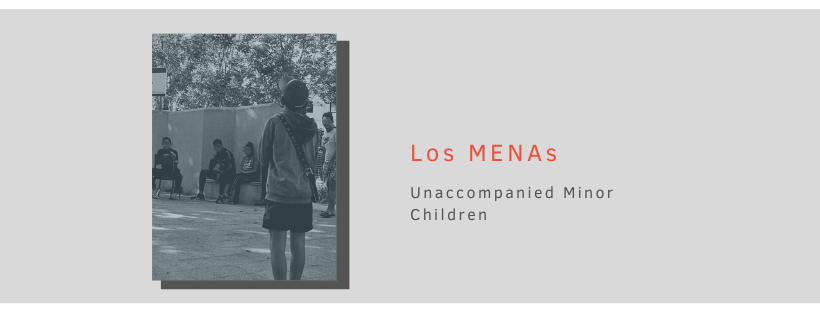
Factsheet: Unaccompanied Minor Children (Los MENAs)
IMPACT: MENAs (Menor Extranjero no Acompañado, or “Unaccompanied Foreign Minors”) is the term used to describe minors (under the age of eighteen) who arrive in Spain with no parents or guardians. The children come primarily from North Africa and are predominately Muslim. In recent years, right-wing politicians and groups in Spain have targeted and stigmatized them by employing anti-Muslim tropes.
A MENA (Menor Extranjero no Acompañado) is a minor under the age of 18 who arrives in Spain without a parent or guardian over the age of eighteen who then falls under the guardianship of the Spanish government. The exact number of unaccompanied migrant children is currently unknown but some sources estimate 13,796 or 12,301.
Most of these unaccompanied migrant children (77.8 percent) come from Muslim-majority countries, mainly Morocco (68 percent) and, to a lesser extent, Algeria (5.2 percent) and Mali (4.5 percent). Due to the high percentage of Muslims, the Spanish media tends to identify these children as a Muslim group. The other countries of origin include Guinea Conakry (8.4 percent) and Ivory Coast (3.5 percent).
In Spain, the region of Andalusia is by far the autonomous community with the highest number of unaccompanied migrant children (5,183), followed by Catalonia (1,938), Melilla (1,067), and the Basque Country (874). Where there is a high concentration, such as Melilla and Catalonia, the percentage of these children who have committed a crime is 10 percent and 18 percent respectively. In the case of Catalonia, only 12 percent of the overall charges are classified as serious. Significantly, in the region with the highest concentration of unaccompanied migrant children—Andalusia—the crime rate drops to 0.54 percent. Despite this, the Spanish media and political groups have criminalized these children as a group. Due to the high percentage of males (92 percent), they have been labelled “manadas,” a term widely used in Spain to identify groups of men who sexually assault girls following a much publicized case in Pamplona in 2016.
Those who advocate for the criminalization of these unaccompanied migrant children include political groups Hogar Social Madrid and VOX. In July 2019, Hogar Social Madrid hung a banner on a center housing these children in Madrid. The banner read, “Be careful, dangerous MENAs live here.” In the Assembly of Madrid, Hogar Social Madrid presented a legislative initiative that called for the separation of foreign minors and Spanish minors in these centers and stated that these centers should be located three kilometers from the downtown area.
In November 2019, Hogar Social Madrid organized a demonstration outside a center for these unaccompanied migrant children in Hortaleza, a neighborhood in the north of Madrid, to demand “a safer neighborhood.” Demonstrators carried a banner that said, “Criminals out of our neighborhood.”
The second prominent political group critical of this group of children has been the VOX political party. Many VOX leaders such as Rocío Monasterio (Assembly of Madrid), Javier Ortega Smith (Madrid City Council), and Ángela Mulas (Parliament of Andalucia) have been the instigators of acts or critical statements against these unaccompanied migrant children.
The situation of these children in Catalonia was a prominent campaign topic in the last election campaign for the Generalitat of Catalonia, the Catalan regional parliament, due to their significant population in the region. The VOX candidate for the presidency of Catalonia, Ignacio Garriga, included the closure of the centers for minors as one of the key points in VOX’s electoral program.
A December 2019 BBC piece noted that during the electoral campaign, Santiago Abascal, the national leader of VOX, stated, “I meet women who come to tell me that the police tell them not to go out with jewelry on the street; with worried mothers because their daughters arrive at night and are afraid of being assaulted,” in reference to the center in the Hortaleza neighborhood. In September 2020, Abascal went to one of the centers housing unaccompanied migrant children in Madrid and claimed that it was causing “insecurity” in the streets and neighborhood businesses.
In the chamber of the Spanish Parliament, Abascal was harshly critical of these unaccompanied children stating that “None of the menas who steal, attack or rape have come to contribute anything to Spain.” In his comments, he differentiated between those who commit crimes and those who do not and called for the expulsion of those who commit crimes.
In this climate of hostility, unaccompanied migrant children have begun to suffer harassment and aggression on the streets. These aggressions have not only multiplied in places such as Madrid and Saragossa but have also spread to the centers for minors. These centers have been identified as havens for delinquents and have been targeted by right-wing groups.
Experts have expressed concern about the term“MENA,” which some have suggested is used in a negative and harmful manner. Sara Collantes, a migration specialist for the Spanish Committee of the United Nations Fund for Children (UNICEF), noted that the term has been “taken out of context and used in a negative way, with a very strong stigmatizing charge.” Collantes stated, “We call them unaccompanied migrant children, which is the terminology used by the ‘Convention on the Rights of the Child.’ They are children who leave their country and travel alone without the company of an adult.”
This factsheet is published in collaboration between the Bridge Initiative and researchers and faculty at Universidad Pontificia Comillas and Universidad de Granada. More information about this project can be found here.
* a Spanish language version of this factsheet can be found here
Last updated May 27, 2021

 Search
Search